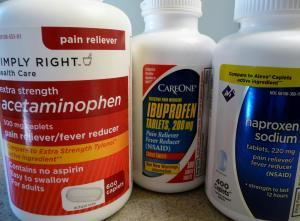Human Medications That May be Toxic to Pets
- posted: Aug. 13, 2017
 Toxic Medications—Don’t Give that to Your Pet!
Toxic Medications—Don’t Give that to Your Pet!
Many people think that if a medication they take themselves is okay, it must be safe give to give to their pet. But, in reality, the physiology and metabolism of dogs, cats and other animals varies from that of humans as well as from each other. What might be safe for a person is not necessarily safe for a dog. And cats often cannot use the same drugs as dogs. While it’s true that some human drugs are okay for our pets, never give anything to your pet unless you have first checked with your veterinarian. This week, we discuss some medications that can be very toxic to pets.
Non-steroidal anti-inflammatory drugs, better known as “NSAIDs” such as ibuprofen, naproxen sodium and even aspirin should not be given to dogs and cats. These drugs can cause bleeding in the stomach and intestines as well as liver and kidney damage in some pets. Cats are especially sensitive to the effects of these drugs as they lack certain enzymes to properly metabolize them. While a single dose of aspirin in a dog is not likely to cause serious problems, over the counter use of human NSAIDs in animals is not recommended. There are veterinary NSAIDs formulated specifically for pets such as Onsior for cats and Rimadyl for dogs. While they are not completely without the chance of side effects, they tend to be safer for our furry friends when used correctly. If your pet is in pain, consult your veterinarian for the best drug and proper dosages before reaching for an NSAID from your medicine cabinet.
Acetaminophen (Tylenol) is often taken by people who cannot tolerate NSAIDs, so, it must be safer, right? In fact, acetaminophen is extremely toxic to cats and should NEVER be given to our feline friends. It can be toxic in dogs as well if they ingest high doses. Acetaminophen is metabolized in the liver. Cats lack an enzyme to properly break down the drug, so toxic metabolites build up in the bloodstream causing liver damage and damage to red blood cells. The substance called hemoglobin in the red blood cells is changed and the cells are no longer able to properly carry oxygen, so the blood turns brown and lack of oxygen to vital organs causes severe organ damage and death. Cats may exhibit vomiting, lethargy, difficulty breathing, swollen face and paws, and brown or blue gums. If recognized early, treatment may be possible, but this medication can be fatal to cats.
Sleep aids may seem like a safe thing to give your pet if he is anxious or up all night. But sleeping pills like Lunesta, Ambien, Xanax and other benzodiazepines could cause either extreme sedation, slow heart rate and decreased breathing rate or, an adverse reaction causing hyperactivity and agitation could occur. Xanax (alprazolam) is sometimes prescribed by veterinarians, but should only be used at proper dosages prescribed by your vet.
Pepto bismol and kaopectate can sometimes be used in dogs, but, they contain aspirin-like compounds known as salicylates that are toxic to cats, so don’t give Pepto or Kaopectate to your kitty.
If you have given one of these drugs to your pet, please be up front with the vet when he or she asks if you are using any medications. We may want to prescribe medications that may not be safe to use if you pet has been taking aspirin or some other drug. Help us to prevent potentially deadly drug reactions by letting us know all medications and supplements your pet is taking, even over the counter drugs.
This blog brought to you by the Patton Veterinary Hospital serving Red Lion, York and the surrounding communities.
Location
Patton Veterinary Hospital
425 E Broadway
Red Lion, PA 17356
